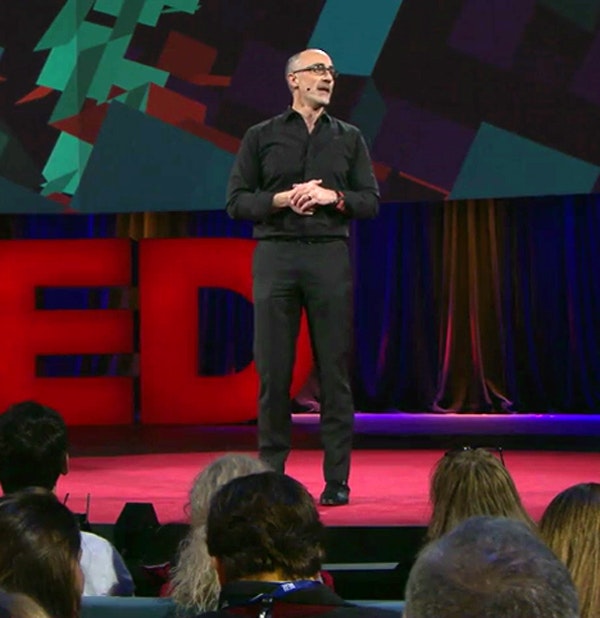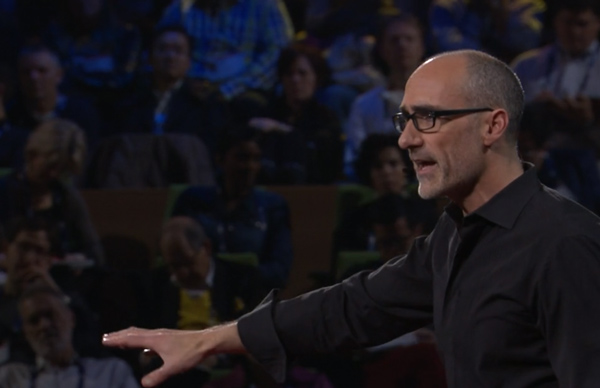In Defense of Differences, Localism, and Globalism
Move past partisan cynicism but don’t forgo strong debate. Empower local government and even neighborhoods. The American Enterprise Institute’s Arthur Brooks discusses these and other ideas to move America ahead — while reminding us that engaging with the world does not preclude prosperity at home.
 Arthur Brooks on stage at TED2016 in February. <a href="https://www.ted.com/talks/arthur_brooks_a_conservative_s_plea_let_s_work_together">Watch video</a>
Arthur Brooks on stage at TED2016 in February. <a href="https://www.ted.com/talks/arthur_brooks_a_conservative_s_plea_let_s_work_together">Watch video</a>
How does America move beyond its clash of values? How do we reconcile the tension between globalism and nationalism? And how do we grow the middle class?
The Catalyst put these questions to Arthur Brooks, President of the American Enterprise Institute, to hear his views as both the leader of a prominent American institution and an innovative thinker. The social scientist is the author of such works as The Conservative Heart and previously played the French horn professionally with the City Orchestra of Barcelona.
We’ve been through an election where there has been a heated clash of values. In a TED Talk, you said you would like to see “the holy war over ideology turn into a competition of ideas.” What would a competition of ideas look like and how could it help us actually resolve problems?
A true and productive competition of ideas requires two things. First, it does require real, hot intellectual firefights over particular public policy questions. But second, it requires us to remember that more often than not, both sides are aiming at the same moral consensus – one which the vast majority of Americans hold in common.
That mixture proves difficult to achieve in practice. Partisans on both sides have no problem charging into the policy gunfight with both barrels blazing, of course. But they spent all of 2016 completely failing to acknowledge an ounce of basic moral goodness in their opponents.
Partisans on both sides have no problem charging into the policy gunfight with both barrels blazing, of course. But they spent all of 2016 completely failing to acknowledge an ounce of basic moral goodness in their opponents.
Both halves of this country have spent years stewing in record-high levels of contempt and cynicism about the motives – not just the ideas, but the motives – of everyone whose politics differ from their own. The result? Everyone is demoralized, for starters. And more practically, even obvious reforms are proving almost impossible to implement.
But the conventional solutions for this partisan unpleasantness are seriously un-compelling. It is too easy to slip into the misconception that intense policy debates themselves are the problem. We construct a false idol out of the fantasy that disagreement is inherently bad, and that if only everyone would be fair and factual, we could find a tidy technocratic consensus square in the middle of each debate. I see this notion as completely unpractical, and even if it were possible, I don’t even see it as desirable.
Liberals should be liberals. Conservatives should be conservatives. We should not be bashful about smart, strong disagreements about which public policies are the best instruments for helping more people access freedom, prosperity, and the pursuit of their happiness.
Liberals should be liberals. Conservatives should be conservatives. We should not be bashful about smart, strong disagreements about which public policies are the best instruments for helping more people access freedom, prosperity, and the pursuit of their happiness.
I’m a free-market-loving policy wonk who runs a think tank – I live for those sparring matches. (And, frankly, as a free enterprise guy, I like our side’s odds.) But we must always conduct that intellectual combat with a smile, and the understanding that the vast majority of well-meaning Americans agree about the moral ends at which we are aiming, even if we don’t see eye-to-eye about which means are the best way to get there.

This kind of attitudinal shift will take real effort from each of us as individuals. It is easy to complain about the tone of cable news. It is more difficult to actively foster charity in our own hearts. But if we – especially leaders – have what it takes to pull off this interior transformation, it could bear tremendous fruit.
… the vast majority of well-meaning Americans agree about the moral ends at which we are aiming, even if we don’t see eye-to-eye about which means are the best way to get there.
You recently said that we have federalized our approach to politics and public life; that we are crowding out attention to local matters. Is it possible that local communities could lead to a renaissance in politics from the local level?
Absolutely. It is essential that we devolve serious problem-solving latitude back to lower levels of society.
My fellow Catholics call this idea “subsidiarity.” It’s an ancient social justice principle. It dictates that decisions are best handled as close as possible to the people who are directly affected.
Similarly, the American founders prized the concept of “federalism,” insisting that strong state and local governments were key to preserving unity in a large and diverse republic. And everyone else just knows this as “common sense.” Unless we’re dealing with a national issue that states and localities truly cannot cope with, why should our first instinct be to send huge quantities of money and power to Washington D.C. and then pray we get some of it back?
Localism would make policy more sensitive to local complaints, and make policymakers more accountable to local concerns. Paradoxically, it could also help boost national unity.
It’s counterintuitive to think that a kaleidoscope of different state and local decisions might yield a more unified country than continuing our drift towards one-size-fits-all national policy, but there’s good reason to think that it would. Even in the internet age, America remains a massive and heterogeneous nation.
Significant regional differences persist in political views, social mores, and lifestyle preferences. It creates a hugely suboptimal equilibrium if we escalate most our decisions to the United States Congress, where — if the issue is even remotely controversial — almost half of the country is guaranteed to go away unhappy.
It creates a hugely suboptimal equilibrium if we escalate most our decisions to the United States Congress, where — if the issue is even remotely controversial — almost half of the country is guaranteed to go away unhappy.
 Arthur Brooks speaking at the 2015 Conservative Political Action Conference in National Harbor, Maryland. (Photo by Gage Skidmore)
Arthur Brooks speaking at the 2015 Conservative Political Action Conference in National Harbor, Maryland. (Photo by Gage Skidmore)
Even when policy issues do require national action, the principles of localism and federalism can benefit us. For example, the tremendous success of welfare reform in 1996 was not due solely to tighter work requirements. The law also deemphasized the role of the federal bureaucracy and gave states more flexibility to design their own programs, within guidelines. Block-granting isn’t an overnight panacea for the whole welfare state. But as a general rule, expanding local control helps more often than it hurts.
All this is secondary to the biggest reason why local communities are vital. They matter most because of the simple fact that our most serious national problems don’t admit of simple policy solutions, period, at any level.
They will only be addressed through community and interpersonal change. The core of America’s future doesn’t depend on the small tweaks we are able to effect at the 5% extrinsic margin that public policy can control. It rests on the ancient pillars of meaning that make up a flourishing life: Vibrant families; thriving religious communities; cultural norms that honor all honest work (instead of denigrating “blue-collar” labor and “dead-end” jobs).
You can’t undo atrophy in those institutions with a Cabinet-level Secretary of Middle-Class Morals and a bump in the Child Tax Credit. It will be men, women, families, neighborhoods, and communities that stitch our country’s deepest fabric back together.
One of the pressure points is the tension between globalization and nationalism. Some emphasize the former and others the latter. Is it possible to combine these two ideas in a way where both sides win?
You’ve identified a key flash point that seems to define our current political moment. But more than many of my fellow travelers in the free enterprise movement, I remain largely optimistic on this. I don’t buy the idea that U.S. politics have permanently morphed into a zero-sum battle between our global concerns and our national interest.
The greatest country on Earth can walk and chew gum at the same time. The brightest periods in American history have been eras when Americans were happy and prosperous at home and when we were deeply engaged with world affairs, helping defend vulnerable people from tyranny and actively spreading the institutions of democratic capitalism that have wrought a global anti-poverty miracle in our lifetimes.
The brightest periods in American history have been eras when Americans were happy and prosperous at home and when we were deeply engaged with world affairs.
To an extent that is unique among nations, our success has been mutually complementary with the success of our brothers and sisters around the world. Nothing happened overnight to falsify this long-standing principle. The fundamental economic logic that prosperity is not a zero-sum game is as true today as it is has always been.

So why did these truths become so politically unfashionable so quickly? It’s a complicated question that feels mysterious, so I dug a little bit into the scholarly literature on populism (ironic, I know). The mystery disappears pretty quickly.
For starters, the economists Carmen Reinhart and Kenneth Rogoff have exhaustively studied financial crises around the world. They find that financial meltdowns often yield much slower and weaker recoveries than those that follow ordinary market crashes.
In plain English? Crises like the Great Recession are harder for economies to shake off than crises like the dot-com collapse. Bad policy can easily exacerbate the damage, but the inverse isn’t true: There are no silver bullet policy solutions for instantly alleviating the sclerosis and pain that follow a financial crisis.
As a result, political scientists find that citizens often take a more nationalist perspective in the wake of such crises. Faced with protracted suffering and an “establishment” that seems to lack solutions, people start suspecting that the answer might be to withdraw from the world and turn inward. Even if trade crackdowns or military retrenchment won’t substantially improve citizens’ lives, these ideas sound bold and new amidst an apparent drought of other solutions.
Faced with protracted suffering and an “establishment” that seems to lack solutions, people start suspecting that the answer might be to withdraw from the world and turn inward.
But here’s the good news. The policies that will best help millions of marginalized Americans recover their places in society are the same policies that will push prosperity all around the world. This country needs a new economic agenda that is radically pro-work, pro-growth, and pro-human dignity. We need our government to stop treating our vulnerable neighbors as superfluous – as mere liabilities to manage at minimal cost through a welfare state – and start treating them like valued human assets to build up and empower.
In short, Americans have deep and valid frustrations. Actually remedying them will take more free enterprise, not less – and more productive strategies for pushing free enterprise into all the forgotten corners of this country.
My AEI colleagues and I are working hard to continue developing this vision. Stay tuned from more work from our scholars, and for a forthcoming essay from me this spring that lays out a framework in greater detail.
We need our government to stop treating our vulnerable neighbors as superfluous … and start treating them like valued human assets to build up and empower.
-
Previous Article To Move Forward, Let’s Not Lose Sight of the Customer An Essay by Kenneth Hersh, President and CEO, George W. Bush Presidential Center
-
Next Article Learning to Hear the Other An Essay by Mike McCurry, Distinguished Professor of Public Theology, Wesley Theological Seminary, and Former White House Press Secretary


